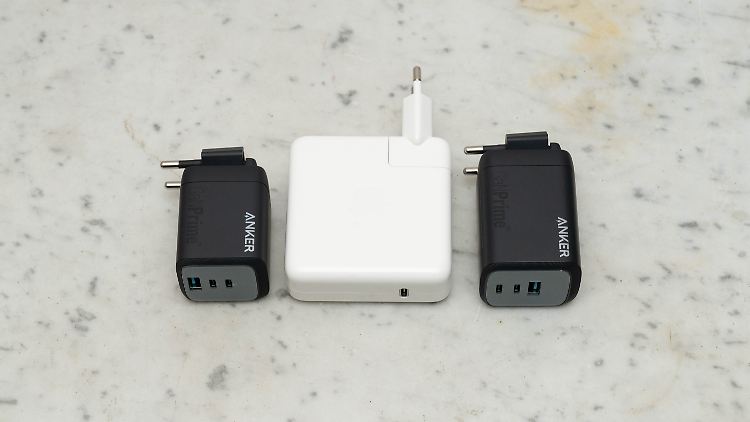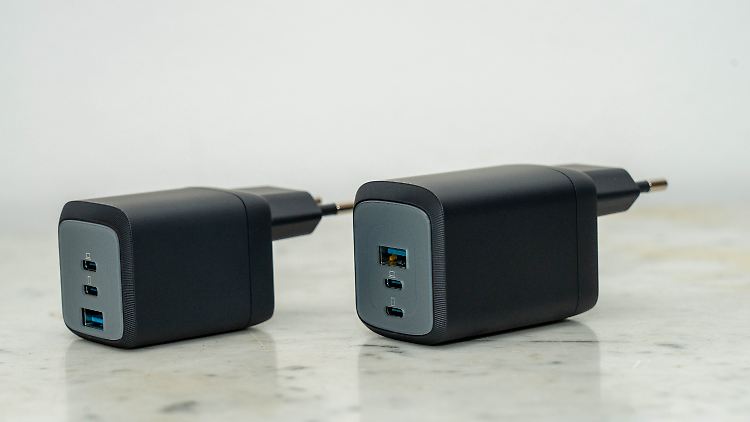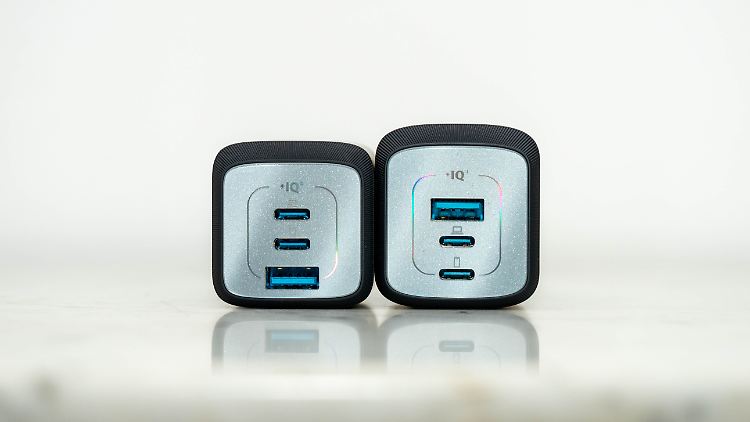Compact and versatile
Anker Prime 735 and 737 charge almost every device
This audio version was artificially generated. More info | Send feedback
The Anker Prime 735 and Prime 737 are very compact power supplies with 65 or 100 watts and three connections each. In the practical test, the charging stations charge smartphones, notebooks and smartwatches or any other mobile device quickly and reliably at the same time.
In addition to smartphones, most households have a number of other mobile devices whose batteries need to be charged regularly. Many of them require their own power supply, which the EU-mandated USB-C port does little to change. Laptops, for example, require higher charging performance than smartphones, the charging speed also depends on various standards, and often nothing happens when using third-party power supplies.
These problems should not arise with the Anker Prime 735 and the Anker Prime 737. They can supply up to three consumers at the same time and support almost every charging protocol. ntv.de tried out the duo without finding a device that couldn’t recharge the power supplies.
It couldn’t be more compact


Size comparison with Apple’s 61 watt power supply.
(Photo: kwe)
Both Anker newcomers have a new folding plug in common, which makes the already comparatively small devices even more compact. The 735 measures 3.98 x 3.85 x 5.03 centimeters and weighs 158 grams, the 737 is 4.4 x 3.9 x 7.45 centimeters and weighs around 181 grams. According to Anker, the 735 is an impressive 51 percent smaller than the original 67-watt charger on a MacBook Pro. The 737 is said to be 45 percent more compact than Apple’s 96-watt adapter.
The design is chic and the workmanship is high quality. You don’t have to worry about the folding mechanism breaking down, the hinge seems very solid. The safety of a power supply is even more important, especially if it has high performance. Anker uses a technology in which the charging process is constantly monitored. The temperature should be measured up to three million times per day.
Controlled hotheads
However, the devices can still get hot. In the practical test, the power supplies were no more than lukewarm under low load. When they had to perform at their best, the temperature rose to around 65 degrees on the 737, while the smaller Anker Prime stayed a little cooler at around 60 degrees.


Under maximum load, the devices get very warm, but never too hot.
(Photo: kwe)
Transistors based on gallium nitride (GaN), among other things, are responsible for ensuring that overheating does not become a problem. Anker has been using the material since 2018. It can tolerate higher voltages and temperatures than commonly used silicon. This also means that GaN chargers can work much more efficiently, i.e. save more energy.
high efficiency
According to Anker, ideally they convert up to 95 percent of the energy they absorb. In the practical test, ntv.de measured an output of around 96 watts with the Prime 737 with a power consumption of around 103 watts. The values for the 735 are 69 and 64 watts. You cant complain.


It is best to connect notebooks to the socket with the corresponding symbol.
(Photo: kwe)
The maximum performance varies between devices. Basically, 100 and 65 watts are available in total, regardless of how many connections are used. With the more powerful power supply, both USB-C outputs are in principle capable of delivering maximum performance. However, only the connection that has a laptop symbol is capable of doing this reliably. The test notebook occasionally complained about low charging current at the other socket with a smartphone symbol. The USB-A port has a maximum of 22.5 watts.
Basically the same applies to the Anker Prime 735. However, it only achieves 64.5 watts at best when all outputs are occupied. Only one USB-C socket alone can achieve 67 watts; each combination of two achieves a maximum of 65 watts.
At least as good as Apple’s charging parts
It’s no surprise that the charging times for an iPad or iPhone are faster than with a 15-watt charger from Apple. In the test, however, the Anker devices were about as fast as Apple’s 61-watt adapter (2016), at just under 30 watts with an almost empty iPad 9 and an 85 percent full iPhone 15 Pro Max.
At 90 and 60 euros, the Anker power supplies are not cheap, but considering their performance and versatility, they are inexpensive. For comparison: Apple’s 35-watt adapter with two USB-C outputs costs 65 euros, the manufacturer’s other chargers only have one USB-C socket.
However, buyers of a Prime 735 or 737 may have to expect additional costs. Because top performance in charging and data transfer is only possible with high-quality USB-C cables. For example, a 1.8 meter long Anker 765 (140 watts) costs 33 euros.
Conclusion
Depending on how much total power is needed, both the Anker Prime 737 and 735 can easily replace most, if not all, mobile chargers in a household. They often represent an improvement over manufacturer power supplies. Thanks to their very compact design, they are also ideal travel companions that take up almost no space in a suitcase or backpack. The price-performance ratio is good for the high quality. If you want to save money, it’s worth waiting for one of the manufacturer’s frequent promotions.


